- Home
- Hugh Howey
Sand: Omnibus Edition Page 23
Sand: Omnibus Edition Read online
Page 23
“Where’s Vic going?” Rob asked.
“People out there still need our help,” Conner told his little brother. He stooped down to speak to him. “I’m going to go with her, okay? You’ll stay here with Mom and Palm.”
“I want to go with you.”
“You can’t,” Conner said. He was on the verge of tears, but he had to be firm. “You’re needed here. Take care of Violet. Imagine how scared she must be. How alone she must feel.”
Rob nodded. He scanned the room, perhaps looking for something to do, someone to help. Conner climbed the stairs toward his mom. He dreaded telling her he was leaving, but nothing had ever felt as right as pulling people out of the sand. The moment he carried his mother and Rob and Violet up into the attic and saved them was like that moment a snake sheds its skin or a baby crow pierces its shell. It had been a sort of birth, a discovery of purpose. He no longer felt like a boy. As he reached the top of the stairs, he thought even his mother was looking at him differently. Even Palmer.
“I’m going to help Vic for a few days,” he told them. “You’ll look after Rob and Violet?”
His mother nodded, and Conner saw her throat constrict as she swallowed back some word or sob. She reached out and squeezed his shoulder, and he was about to turn away when she reached into her pocket and brought out a folded piece of paper. “Give this to Vic,” his mother said. “Make sure she reads it. She needs to believe.”
Conner accepted the paper and stuck it into his pocket. “I’ll make sure she gets it,” he promised. “I’m going to let Violet know I’ll be gone for a while. You’ll look after her?”
His mother nodded. Conner thanked her and turned to her room, which no longer had the same repulsive effect it used to. It had been cleansed by the sand that had passed through it; it had been scoured clean. He heard Palmer hurry up behind him and felt his brother grab his arm.
“Hey, Con, we need to talk.”
Conner stopped. Over Palmer’s shoulder, he saw their mother heading back down the stairs to tend to the stricken. “What is it?” Conner asked.
Palmer glanced at their mother’s door like there was still something to fear there, like one of her drunk clients might lumber out at any moment and crash into them and send them over the edge of the balcony with its missing rail. “This way,” Palmer said. He guided Conner past the room where Violet lay, his voice a conspiratorial whisper.
“You okay?” Conner asked. His brother looked better than he had in the sarfer earlier that day, had salve on his blistered lips and food in his belly. But something seemed off.
“Yeah, yeah, I’m fine. It’s just that … this girl who claims to be our sister—”
“Violet,” Conner reminded him.
“Yeah, Violet. It’s just that … Mom took me in there and told me her story, let me talk to her. She and Rob told me about the other night—the night you went camping—and about where she came from.”
“No Man’s Land.”
“Well, maybe.” Palmer glanced at the door again and pulled Conner even farther down the balcony. “It’s just a little unbelievable, don’t you think? I mean, you really buy her story? Because—”
“I was there,” Conner told his brother. “I’m telling you she speaks the truth. She knew who I was.”
“I know, I know. But here’s the thing. The guy who did this to me …” Palmer pointed to his face. “This guy Brock who hired us to find Danvar, who killed Hap, he’s got this strange accent. Everyone says it comes from the north. And this girl sounds just like him.”
“You think Violet is some cannibal?” Conner didn’t have time for this, but his brother really seemed concerned. Vic had told him that their brother was pretty rattled from his experience, that he’d been through a serious ordeal. It was strange, this, to pity an older brother.
“I’m not saying anything, Con. I just know what I hear. And her showing up and then the wall coming down at the same time? And Danvar? Everything happening at once like this? You buyin’ that?”
Conner squeezed his brother’s shoulder. “I don’t know what’s going on,” he said truthfully. “But I believe that girl in there is our sister, and I think Dad is still out there somewhere.”
Palmer nodded. There were tears in his eyes. “Yeah,” he said. “You’ve always believed that.” And there was nothing accusing in his brother’s voice. Something more like envy.
“I’ve got to go,” Conner said.
“Yeah.”
“Good to see you,” he told his brother. And the two of them embraced. They exchanged hearty slaps on each other’s backs that loosened the sand in their hair. And Conner remembered how angry he’d been at Palmer the last few days, at the betrayal of his not being there to go camping with them, and such concerns seemed petty. Beneath his worry.
“I love you, Brother,” Palmer whispered in his ear.
And Conner had to turn and go quickly away before his great facade crumbled.
51 • Waterpump Ridge
Conner moved through the darkened dunes with an empty dive tank on his back and a regulator swinging by his hip. He didn’t head straight for the sarfer. There was one other person he needed to see before he left. He had to know she was okay. Had to see Shantytown and his home and some place where he could imagine life clinging and continuing on when he got back.
There were a few torches and lamps burning out across the dunes. Occasional voices could be heard as people shouted into the wind, calling for one another. The sand in the air was mild, the stars overhead bright. The glow of illumination in Springston that normally drowned out the constellations had been smothered. Extinguished. Conner thought of all the diving that would need to be done to reclaim what the sands had taken.
As he headed toward Gloralai’s place, Conner became aware of some guilty and latent thrill at his being alive. He felt a raw power for having survived being completely buried in drift. There was also some strange pang of guilt for having been present and on the earth for so momentous a disaster as the fall of the great wall. It wasn’t enjoyment—was nothing like enjoyment. There was too much a darkness over everything, too much a longing, a deep ache; but behind it all there was a tiny voice telling him how good it felt to be breathing, how great it felt to be above the sand, and could he believe what he’d just witnessed?
Conner hated this voice. There was no excitement in this. Nothing but tragedy and loss and now an uncertain and terrifying tomorrow. The wind-blown dunes would swamp Shantytown as never before. Another chaotic Low-Pub awaited here. A lesson was coming for his people, a lesson that there is always a new and greater misery to fall back upon. And thinking this caused the endless days to stretch out before him—days when hauling buckets away from the water pump would be remembered with the same blissful nostalgia as hot baths and flushing toilets. Always more room to fall. The sand went down and down and didn’t stop.
He veered slightly out of his way as he thought these things; he wanted to swing by his house. There was nothing there for him—he’d carried everything out of there for his trek across No Man’s Land, a decision and deed that seemed so very far away now—he just wanted to make sure the front door was unburied, that he and Rob would have a place to go to, that the sand around their home hadn’t collapsed shut from the grumbling of the earth.
The door was still there. The scaffolding was still webbed atop his home. And it looked like there might be a lantern burning inside. Light squeezed around the crooked door.
Conner approached slowly. He didn’t knock, just tried the handle, found it sticky as usual but not locked. He pushed it open.
A man turned toward the door, his eyes growing wide over his neatly cropped beard. He and two boys sat around Conner’s kitchen table. There was the smell of food cooking. The man got up, the chair tipping backward and crashing to the floor, both of his hands out in front of him.
“I’m sorry,” the man said. He reached for his children, who had stopped eating their soup, who sat with frozen expressi
ons on their faces. They all had on such nice clothes. “We’re going. We’ll leave. We meant no harm.”
“No,” Conner said. He waved the man back. “Stay. This is my place. It’s okay.”
The man glanced toward the dark bedroom. Conner couldn’t tell if there was anyone in there, thought maybe the man was thinking that there wasn’t room enough for him and his children to stay.
“Are you from Springston?” Conner asked.
The man nodded. He righted the chair and rested his hand on its back. The children went back to slurping. “I took the boys out on the sarfer this morning. We saw it happen, saw all of it. My wife—” He shook his head and looked away.
“I’m sorry,” Conner said. He adjusted the empty dive tank on his back. “Stay here as long as you like. I was just checking on the place.”
“What about—?”
“I’ve got somewhere to stay tonight,” Conner assured him, thinking of the sarfer and a night beneath the stars. “I’m sorry for your loss.” He turned to go, but the man was across the room, clasping him on the shoulders.
“Thank you,” he whispered.
Conner nodded. Both men had tears in their eyes. And then the man hugged him, and Conner thought how this would’ve seemed a strange thing a day ago.
••••
Gloralai wasn’t at her house. Conner knocked and waited, but the windows were dark, and there was no sound within. He tried the schoolhouse next, thinking that this was where his friends would gather. He spotted Manuel’s mother hurrying between the dunes, her face partly lit from the spitting torch in her hand. Manuel was a classmate. Conner stopped her and asked how he was. She squeezed Conner and said that he was at the well with the others. She asked about Rob.
“Rob’s fine,” Conner said. He asked if she knew where Gloralai might be.
“I think all the sissyfoots are at the well.”
Conner considered the hour and realized he was probably supposed to be there as well. It had been a school day, a fact forgotten not just from looking after Violet at the Honey Hole but from leaving class on Friday expecting never to come back. It was after dark, and he would normally have hauled his quota by now. He thanked Manuel’s mom and hurried toward the well. The sudden awareness that the sand would never stop hit him. Not even for the collapse of the wall. Not even that night, for them to rest and regain their senses, to count and properly bury their dead. Buckets still had to be hauled or they would go thirsty. The gods were merciless. Vic was right. This was the sort of cruelty that only came from turned backs, from being ignored. Well-aimed lashes and direct blows were more easily understood. At least then the stricken knew their anguished cries were being heard.
He aimed for the dancing torches atop Waterpump Ridge. A lot of activity. He could imagine the haul shifts starting late, a period of chaos as the schoolhouse emptied and the sand washed out Springston, nobody knowing what was going on. It was strange, the separation he felt from his peers, thinking on where he’d been all day and what he’d been doing. But here they were, his classmates, keeping the water flowing, saving far more lives than he. There was perspective in this. The man who had broken into his home and had stolen what little Conner had left in his cupboard—that man couldn’t be blamed. The larger rules of the world were broken, the Lords’ rules. But the simpler rules that guided the heart of each man were intact. These were the rules that never changed. Knowing right from wrong. Surviving and letting others be. Maybe even lending a fucking hand.
“Conner?” someone asked, as he approached the outhaul tunnel. It was Ashek. He must’ve been on his way down from dumping his buckets, as his pole was held casually across one shoulder. “Where you been, man?”
The two boys clasped hands, and Conner lowered his ker. They had to strain to see each other in the flicker of torchlight. The moon would not be up for hours yet.
“Been helping my mom,” Conner said, not wanting to explain any further. “Hey, have you seen … is everyone else here? Everyone okay?”
“Yeah, except for the kids who didn’t show up for class. But most of them weren’t around yesterday either. Off diving for Danvar. So I’m sure they’re fine. I just passed Gloralai on the way down. She was taking a haul up to the ridge.”
“Uh … yeah … thanks.” Conner tripped over his words. He hadn’t mentioned looking for her, didn’t think anyone knew he liked her, not even Gloralai herself. He thanked Ashek again and headed up the ridge. Dark shapes blotted the stars on the path up, and Conner felt naked without his haulpole and buckets. A large figure ahead, a familiar voice. Conner saw Ryder huffing his way down the sand path. The two boys stopped and looked at each other. Ryder tugged his ker off his mouth.
“You okay?” he asked.
Conner nodded. “You?”
“Fuck no. I should be out diving, not doing this shit.”
“This is just as important,” Conner said. He kept himself square to Ryder and hoped the boy didn’t see the tank on his back.
“Yeah, whatever.”
But there was something different as Ryder went past him and strode down the sloping sand. More of what had seemed significant falling away from yesterday’s cares. The things at the center of Conner’s universe no longer were. The world had wobbled; its axis had shifted; the core was now at the periphery and vice versa. But there, higher up the ridge, a slimmer hole stood out in the dense constellations, a familiar form, the memory of a beer and a bowl of stew, of thinking that running away might not be the answer. Conner joined Gloralai on the top of the ridge just as she dumped the last of her sand into the wind. When she turned and saw him, there was a gasp. She dropped her pole. Arms around his neck, nearly knocking him over, the feel of her sweat on his skin and not caring. Enjoying it. A sign of her toil. The embrace letting him know she cared. That he wasn’t alone.
“I’ve been so worried,” she said. And Conner realized why Ashek had told him where she was. She had been looking for him. She pulled away and brushed the hair off her face. Everywhere she had pressed against him cooled in the breeze. The sand in the air stuck to the sweat she’d left on his skin, and Conner didn’t mind. “Someone said you pulled Daisy’s kids out of the courthouse. Is that true?”
Conner wasn’t sure. There’d been dozens of people. They’d all looked the same in his red dive light. “I remember the courthouse,” he said.
Gloralai placed a hand on his arm and turned him, looked at the dive gear on his back. “You went camping. You didn’t come back. I thought—”
Conner reached out and placed a hand on the back of Gloralai’s neck. He pulled her close and kissed her, staunching her worry and his as well. She kissed him back. The tank fell to the sand, arms snaking around one another, her lips on his neck, a classmate dumping his buckets in the nearby dark and saying, “Get a fucking room.”
Laughter against his neck. Her exhalations. Conner kissed her cheek and tasted salt. “I’m sorry I wasn’t here,” he said. But what he wanted to apologize for was thinking of leaving. For taking the wrong chance. The wrong chance. “And now I’ve gotta leave town for a while. My sister needs me.”
“Your sister.” Gloralai studied his face in the starlight. Buckets rattled on a haulpole as a silhouette left them alone again on the ridge.
“Yeah. The same people who attacked here might be heading to Low-Pub. I don’t want her going alone.”
“You’re gonna sail there? Tonight?”
“We go at first light.”
“When will you be back?”
“I don’t know.”
“Then I’ll come with you. I have a brother in Low-Pub—”
“No,” Conner said. “I’m sorry. But no.”
Her hands fell away from his arms. “I understand.”
“I’ll find you when I get back,” he promised. And it suddenly became very important that he got back.
“What about your hauls?” she asked.
Conner looked down at her pole and the two buckets. “I’ve carried all
I can today,” he said. “They’ll have to understand.”
“You staying at your place tonight? Can I come see you?”
Conner thought of the family in his home. “No,” he said. “I’m camping with my sister on her sarfer.”
“And you leave at first light.”
“Yeah.”
Gloralai took his hand. “Then stay with me tonight.”
52 • A Pillar of Smoke
“I didn’t think you were gonna make it,” Vic said. She stood by the mast, arranging sheets and halyards by the red glow of her dive lamp. Conner loaded his gear into the haul rack.
“You said first light,” he told her.
Vic nodded toward the horizon where a bare glow could be seen. Maybe.
“Aw, c’mon.”
“Man the jib,” she told him. “But first, get your suit plugged in so it can build a charge. You probably drained it yesterday. And make sure that gear is lashed down. It’s gonna be windy today.”
Conner studied the sand hissing softly against the sarfer’s hull. “How can you tell?”
“I just can. Let’s go.”
He pulled the dive suit she’d given him the day before out of the gear bag. There were two power leads trailing down from the wind turbine, which was thwump, thwump, thumping in the morning breeze. Her suit was lashed to the base and plugged in. He did the same with his, double-knotted the arms and legs around the pole. Then he made his way up the sarfer’s starboard hull and across the netting between the two bows. He checked the jib sheets to make sure they wouldn’t get fouled and knocked the sand out of the furling drum. He could see what he was doing without turning his dive light on, so he supposed maybe she was right about the first light.

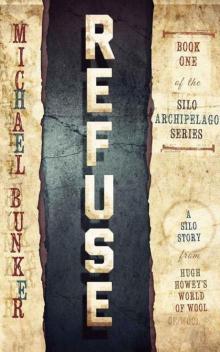 Refuse (The Silo Archipelago Series Book 1)
Refuse (The Silo Archipelago Series Book 1)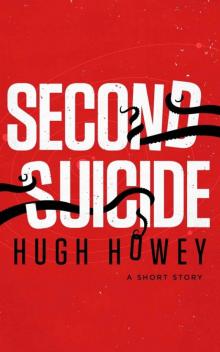 Second Suicide: A Short Story
Second Suicide: A Short Story Machine Learning: New and Collected Stories
Machine Learning: New and Collected Stories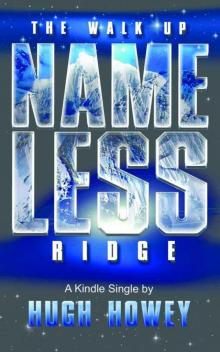 The Walk Up Nameless Ridge
The Walk Up Nameless Ridge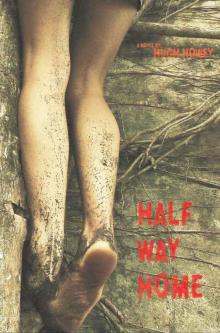 Half Way Home
Half Way Home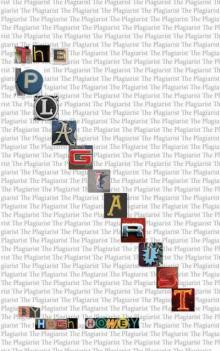 The Plagiarist
The Plagiarist Peace in Amber
Peace in Amber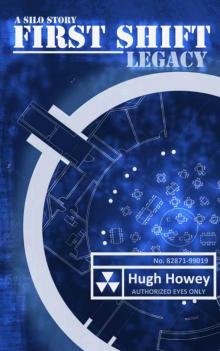 First Shift: Legacy
First Shift: Legacy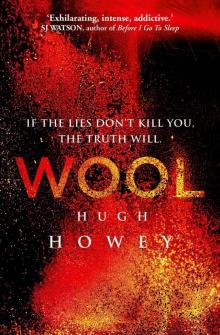 Wool
Wool Glitch
Glitch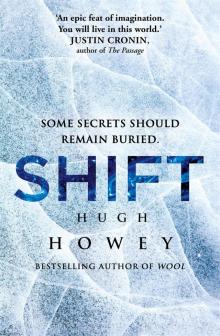 Shift
Shift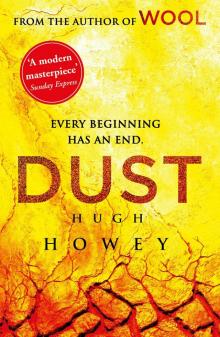 Dust
Dust Molly Fyde and the Land of Light
Molly Fyde and the Land of Light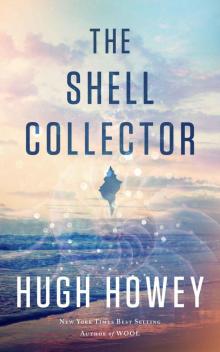 The Shell Collector
The Shell Collector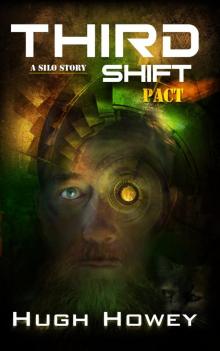 Third Shift: Pact
Third Shift: Pact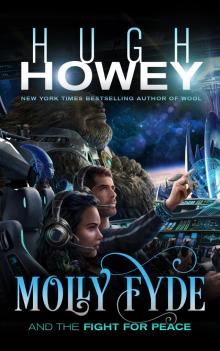 Molly Fyde and the Fight for Peace
Molly Fyde and the Fight for Peace Sand Omnibus
Sand Omnibus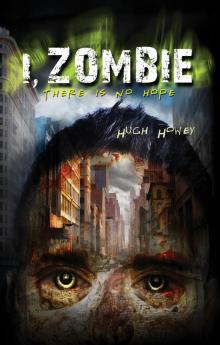 I, Zombie
I, Zombie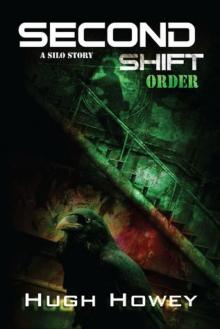 Second Shift: Order
Second Shift: Order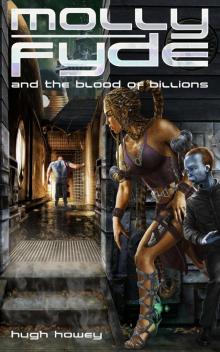 Molly Fyde and the Blood of Billions
Molly Fyde and the Blood of Billions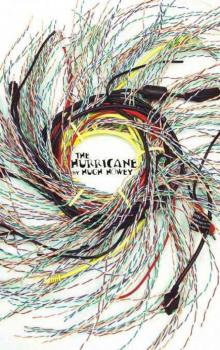 The Hurricane
The Hurricane The Box
The Box Glitch_A Short Story
Glitch_A Short Story Molly Fyde and the Land of Light tbs-2
Molly Fyde and the Land of Light tbs-2 Machine Learning
Machine Learning Resist
Resist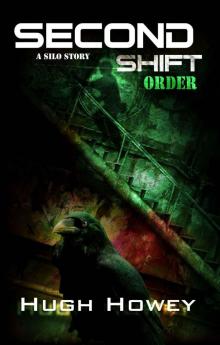 Second Shift - Order (Part 7 of the Silo Series) (Wool)
Second Shift - Order (Part 7 of the Silo Series) (Wool)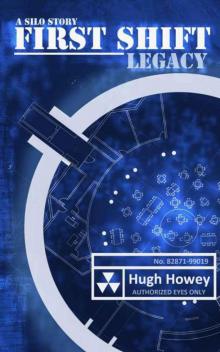 First Shift - Legacy s-1
First Shift - Legacy s-1 Stories on the Go: 101 Very Short Stories by 101 Authors
Stories on the Go: 101 Very Short Stories by 101 Authors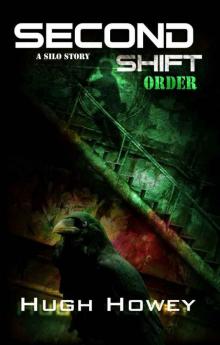 Second Shift - Order s-2
Second Shift - Order s-2 The Robot Chronicles
The Robot Chronicles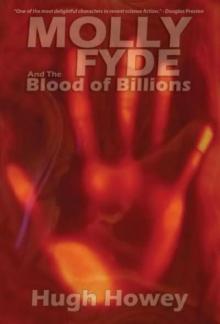 Molly Fyde and the Blood of Billions tbs-3
Molly Fyde and the Blood of Billions tbs-3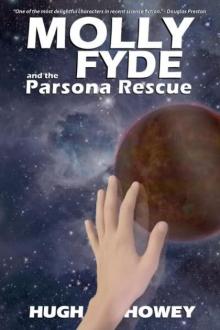 Molly Fyde and the Parsona Rescue tbs-1
Molly Fyde and the Parsona Rescue tbs-1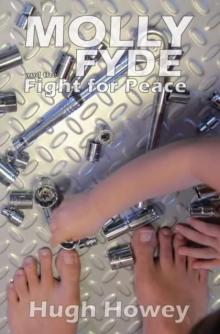 Molly Fyde and the Fight for Peace tbs-4
Molly Fyde and the Fight for Peace tbs-4 Sand
Sand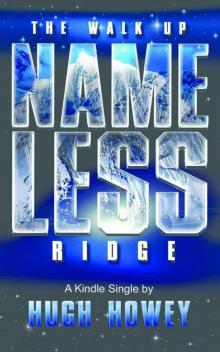 The Walk Up Nameless Ridge (Kindle Single)
The Walk Up Nameless Ridge (Kindle Single) Wool Omnibus Edition (Wool 1 - 5)
Wool Omnibus Edition (Wool 1 - 5) The World of Kurt Vonnegut: Peace in Amber
The World of Kurt Vonnegut: Peace in Amber The Alien Chronicles
The Alien Chronicles Glitch: A Short Story (Kindle Single)
Glitch: A Short Story (Kindle Single)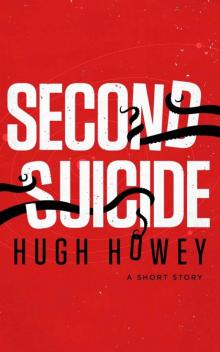 Second Suicide: A Short Story (Kindle Single)
Second Suicide: A Short Story (Kindle Single)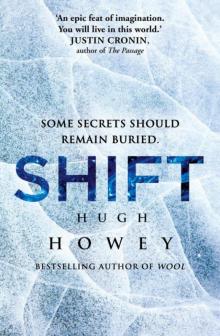 Shift (silo)
Shift (silo)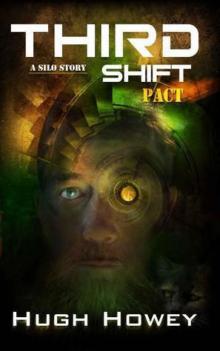 Third Shift - Pact
Third Shift - Pact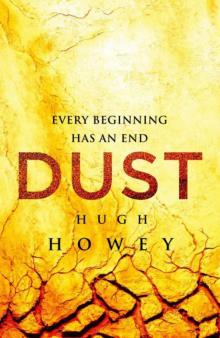 Dust s-9
Dust s-9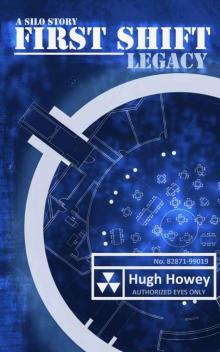 First Shift - Legacy (Part 6 of the Silo Series) (Wool)
First Shift - Legacy (Part 6 of the Silo Series) (Wool)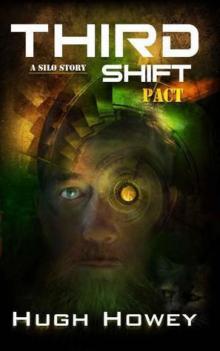 Third Shift - Pact s-3
Third Shift - Pact s-3 Sand: Omnibus Edition
Sand: Omnibus Edition The Box: A Short Story
The Box: A Short Story